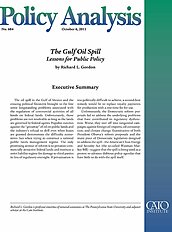Unfortunately, the Democratic reform proposals fail to address the underlying problems that have contributed to regulatory dysfunction. Worse, they veer off into tangential campaigns against foreign oil imports, oil consumption, and climate change. Examination of both President Obama’s reform proposals and the main piece of Democratic legislation designed to address the spill — the American Clean Energy and Security Act (the so-called Waxman–Markey Bill) — suggest that the spill is being used as a pretext to advance dubious policy agendas that have little to do with the spill itself.
The Gulf Oil Spill: Lessons for Public Policy
The oil spill in the Gulf of Mexico and the ensuing political firestorm brought to the fore some longstanding problems associated with the regulation of commercial activities of all kinds on federal lands. Unfortunately, those problems are not resolvable as long as the lands are governed by federal agents. Populist outcries against the “giveaway” of oil on public lands and the industry’s refusal to drill even when leases are granted demonstrate the difficulty economists face when trying to construct a rational public lands management regime. The only promising avenue of reform is to privatize commercially attractive federal lands and institute a strict liability regime for damage to third parties in lieu of regulatory oversight. If privatization is too politically difficult to achieve, a second-best remedy would be to replace royalty payments for production with a one-time fee for use.

This work is licensed under a Creative Commons Attribution-NonCommercial-ShareAlike 4.0 International License.

